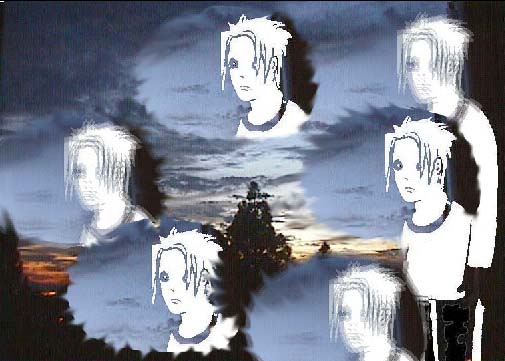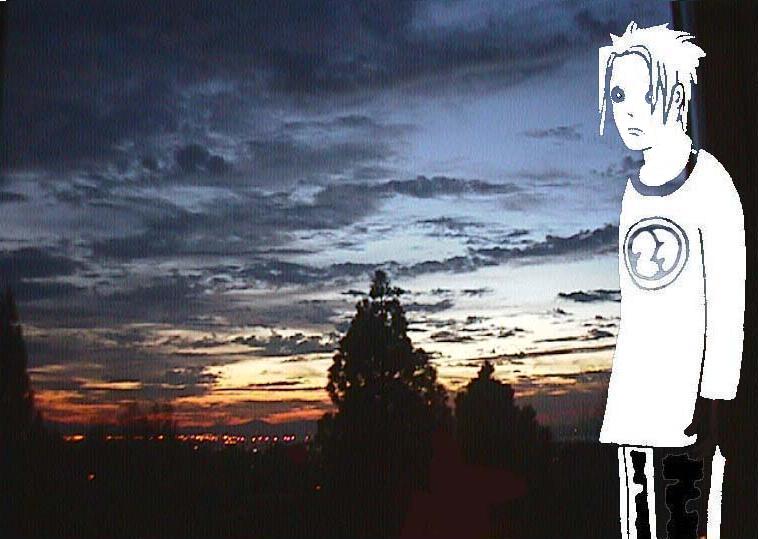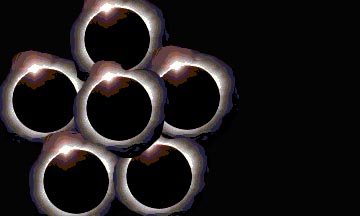A Splinter Emergent
~ click here for color version ~
A few weeks had gone by, and signs and symbols of change
hung in the air as defiant as smoke which refused to dissolve.
Daya knew what I thought of my canvassing job, and had
found me a listing for a parking lot attendant on one of the
campus announcement boards. Still buffeted by the stress of
wandering from door to door, this idea of a simple job,
requiring little intellectual output, seemed too good to be
true.
At the interview, the office manager and I hit it off right away.
Although the job was only temporary, six weeks or so while
the usual attendant visited his family in Asia, I still counted it
an astounding stroke of luck that she hired me on the spot.
When I got back to Daya's, no one was around, and I felt
inspired to call Anna. I had left another message or two with
her sullen friend, but still hadn't heard back, and I wondered
whether they had reached her. It had seemed like she'd
wanted me to talk to her again, at least.
I picked up the phone receiver feeling a small electric crackle
which told me this time was the one.
'Hello, is this Anna?'
"Yes?"
'Hi-- remember me, from the Tortuga?'
"Oh, hi." This was not the right response. While I hadn't
allowed myself to worry that she'd struck up a serious
something already, I experienced a sudden loss of doubt.
'Sounds like you're kind of busy. Should I call back some
other time?'
"No, no, it's okay."
'I talked to your friend a few times... did he tell you I called?'
"Yeah-- he did. I've just been really-- busy."
'Yeah, I get you. It sounds like you two are hanging out?'
"Yeah."
'Well, it doesn't have to be anything in particular between us.
Maybe we could still hang out, have lunch?'
"Uh, I don't think that's such a good idea right now."
And here I had been worrying about hurting her feelings. So
it goes.
'Okay, well, I won't keep you, I just wanted to call and say
that it was cool meeting you.'
She softened just a bit. "Yeah-- you too."
'Okay, well, peace.'
And we hung up.
I understood that this number, this little bit of red ink on a
white scrap of paper, now held all the significance and
promise of an empty water bottle in the desert, and I
respectfully dropped it into the memory hole. But I was still
lonely.
I did, however, find my new routine most congenial. I had
moved from the couch onto Daya's floor, where my sleeping
mat and sleeping bag were plenty comfortable, and, more
importantly, away from the watchful eye of Gene, who had
developed a zealous interest in sitting on his sofa in the
mornings.
Since Daya left for a class about the same time I left for work,
one alarm served us both. I caught my first bus downtown,
where I held my thin paper transfer and talked to Bill, the
genteel homeless doorman of the nearby coffee shop, who
opened the door just as sprightly for those who did not add
coins to his waiting cup as for those who did. The second
bus carried me right to the parking lot. If I had a few extra
minutes, I would allow myself a small coffee and a muffin at
the coffee-shop, adding my change to Bill's cup as I walked
back outside to wait.
The first time I dropped something in his cup, I told him,
'You know I don't really have much, but I'll do what I can do.'
Bill's raspy voice answered me from his salt-and-pepper
beard, "Then I'll count that quarter a few times, coming from
you." He winked at me as he rattled the coins in the bottom
of the cup together.
'I notice you're still nice to people who don't give you
anything, smile at them even if they don't look at you when
you open the door for them.'
"Well, one way to look at it is that the people who run the
coffee shop let me do this because they know I'm not
bothering anybody. Another way is that just because
someone is some way, don't mean I have to be that way, too."
A soft light settled on him, the sun not yet having cleared the
edges of the buildings, and I felt sad, not that he had no
home, but that so little dirt attracted so much indifference,
and cruelty.
The parking lot almost watched itself. On days when the two
buses ran too close together, I would wait to eat breakfast
until nine, when all the cars were already nestled into the
parking lot for the day, then duck into the West Side Bakery,
where the gingerbread almost oozed molasses onto the
waxed paper, and carried threads of ginger as thick as carrot
shreds in every bite. Except for a brief period of activity at
lunchtime, dampened by carpooling, nothing stirred for
hours except the thick fluffy clouds that swept through the
enormous blue sky, day after day. I began to realize that I
hadn't experienced this much winter sunshine, or time to
think, in my entire life, and odd, happy feelings floated
through my peripheral vision as the clouds danced over me.
The actual booth was tiny, but it had a comfortable stool with
a back, a heater for the colder days, and a little shelf with
enough room to eat and spread out a large book. The hours
flew by so quickly that I read 'Crime and Punishment' in three
days while my copy of 'Last Rights' looped through my tape
player's headphones.
I couldn't understand Raskolnikov, not consciously, and I
puzzled over his violent unpleasantness and self-defeating
guilt with a haughty Zarathustrian eye. As I stared through
the floor, ruminating on his choices, I spied an old newspaper
in the corner of the booth whose headline announced the
acquittal of all of the officers in an infamous police brutality trial.
Unbidden, the old woman in the dingy hallway became a solitary figure in blue,
hoisted and crucified onto an old vw beetle using railroad spikes,
then rolled gently out into oncoming traffic.
An angry middle-class pacifist floating by demanded, don't those cops have
families? And I answered, don't those who are clubbed down in videos, sent
to prison for a few dollars of crack, shot
unarmed in the streets, have families too?
I poured my nervous energy into random sketching, designs
and faces pouring out as the soundscape shifted down the
stairs around me. My hand looped and refined one
particular design, one particular face until it became a mantra
underneath my pen, a caricature of an arched eyebrow and
warped smile I saw appear on doorways, alleys, other
strange places, far into the future.
That evening, after work, I knew just what I needed. I
wished I had a joint, but the tiny bits my co-workers had
given me were gone. I walked up the road from the parking
lot into the corner liquor store, where I spent two dollars on a
bottle of fortified wine, gulping half of it before I got on the
bus, which carried me far beyond my stop, past the campus,
past a rose garden of empty thorns and empty doorways
framing the shining bay, all the way to the top of the hills,
where I smiled down as the sun slowly melted into the water.








